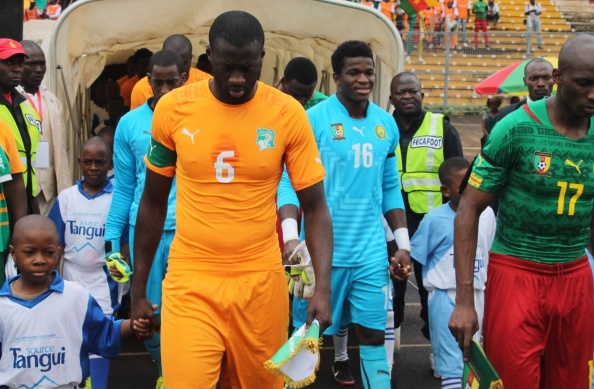
The Elephant of Cote d'Ivoire and the Lions of Cameroon clash in Abidjan, having enjoyed contrasting fortunes in their post-World Cup rebuilding efforts
Today, Cameroon travel to Abidjan to face the Elephants of Cote d’Ivoire in the final qualifier for the
2015 Africa Cup of Nations. One of those teams is assured of a place in Equatorial Guinea, and is enjoying a youthful revolution while the other awkwardly straddles two generations, struggling with a lack of identity and talent.
Cote d’Ivoire going into that game needing a result; a draw would do, but a loss leaves them needing Sierra Leone to take points off the Democratic Republic Congo in Kinshasa.
The events of the 18th of June in Manaus were a stain on Cameroon’s World Cup adventure, already tainted pre-tournament by squabbling over bonuses. In the first half, Alex Song elbowed Croatia striker Mario Mandzukic in the back and was rightly sent off; the inheritor of his uncle Rigobert’s ill-luck with expulsions at World Cups.
It got worse in stoppage time when Benjamin Moukandjo felt the full force of Benoit Assou-Ekotto’s afro, apparently for the younger player’s reaction to a piece of advice late in the game.
“Everyone can make a mistake,” Assou-Ekotto told L’Equipe , “but when I told him (Moukandjo) again, he replied ‘Get off my back!’
“I could not accept his reaction. There was so much frustration in that match.”
That 4-0 loss was a new record for Cameroon on the global stage, not so much the result (they plumbed more abysmal depths in defeat to Russia in 1994) but the sense of complete rudderlessness in the display and comportment of the team.
However, it was not all bad. The very next game, effectively a dead-rubber, offered the Indomitable Lions a chance to save face against hosts Brazil. The result was not so different: they conceded four still, but for the opening 20 minutes, they played with a looseness and exuberance that can only come with youth and caused the Selecao problems.
German coach Volker Finke captured it best when he told German reporters after the Croatia debacle “We have to look forward – this team does have players for the future.”

The 66-year-old former Freiburg manager walked the walk too. Out went the likes of Charles Itandje, record-goalscorer and four-time African Footballer of the Year Samuel Eto’o, Assou-Ekotto, Song and the seemingly ageless Pierre Webo.
The turn-around has been remarkable in such a short time. Cameroon are unbeaten in Group D, with 13 points out of a possible 15. A 4-1 crushing of Cote d’Ivoire made the world sit up and take notice, the victory which owed much to the ruthlessness of Clinton N’Jie and Vincent Aboubakar upfront, but also to the heroics of Fabrice Ondoa in goal. Of the trio, only Aboubakar played in Brazil.
The performances have not always been as flashy: Cameroon won both legs against DR Congo by a lone goal, and dropped points against Sierra Leone. Instead, they have been workmanlike and gritty; the gormless display in the summer is now well and truly a thing of the past.
This makes the blow-out against the Elephants all the more incongruous, it was on paper the toughest tie in the group. What made it truly shocking was the face that, unlike the Volker Finke’s side, Cote d’Ivoire were not quite so disappointing in Brazil.
They were eliminated in the group stage all right, but there was no on-pitch hijinks. Under Sabri Lamouchi’s charge, the team came from behind to beat Japan in the opening game. A loss to Colombia in the second would surely have been budgeted for, they were not disgraced by the impressive Los Cafeteros . They were then dumped out in dramatic fashion at the death against Greece, after forward Giovanni Sio gave away a controversial penalty; not even the most cynical could argue they deserved elimination.
While the results and performances did not show it, this was also a side in need of revitalisation, as well as better management from the dugout. Lamouchi resigned and former Zambia coach Herve Renard came in. His unfancied Zambia side had frustrated the Elephants in the final to win the 2012 Afcon, playing well-organised football based on quick transitions through wingers coming inside and pace in attack.

It was always going to be interesting to see him adapt to coaching a big side, and the evidence suggests he has not done so well. There are mitigating factors, however. The loss of veteran Didier Zokora and Kolo Toure to retirement exposed the lack of quality at centre-back; where once the Elephants could call on the experienced Abdoulaye Meite and Blaise Kouassi as options in the position, young Franck Kessie and Ousmane Viera have had to take a crash course in international football.
The results have been expectedly calamitous: aside Cameroon, Cote d’Ivoire also shipped four against DR Congo in Abidjan, having come back from 3-1 down. They have scored 11 times, more than anyone else in Group D, but have the second-worst defensive record in all of Afcon 2015 qualifying, and have yet to keep a clean sheet.
Only with Kolo Toure back were they able to achieve a modicum of defensive stability in a 5-1 win over Sierra Leone, but it was clear that there is much work to be done by Renard to bridge the gap in quality in this team. He is himself aware of the challenge, evidenced by his remark (per RFI’s Christophe Jousset) that Ivorians would have to adapt to semolina, having enjoyed caviar so long.
This is in effect a passing of the torch. Cote d’Ivoire, having dominated African football for most of the last decade (as much as one can dominate without actually winning anything), anxiously fan their embers; in that period, the team they overthrew has undergone a rebirth, and go to Abidjan knowing a win will extinguish the Elephants’ Golden Generation once and for all.
No comments:
Post a Comment